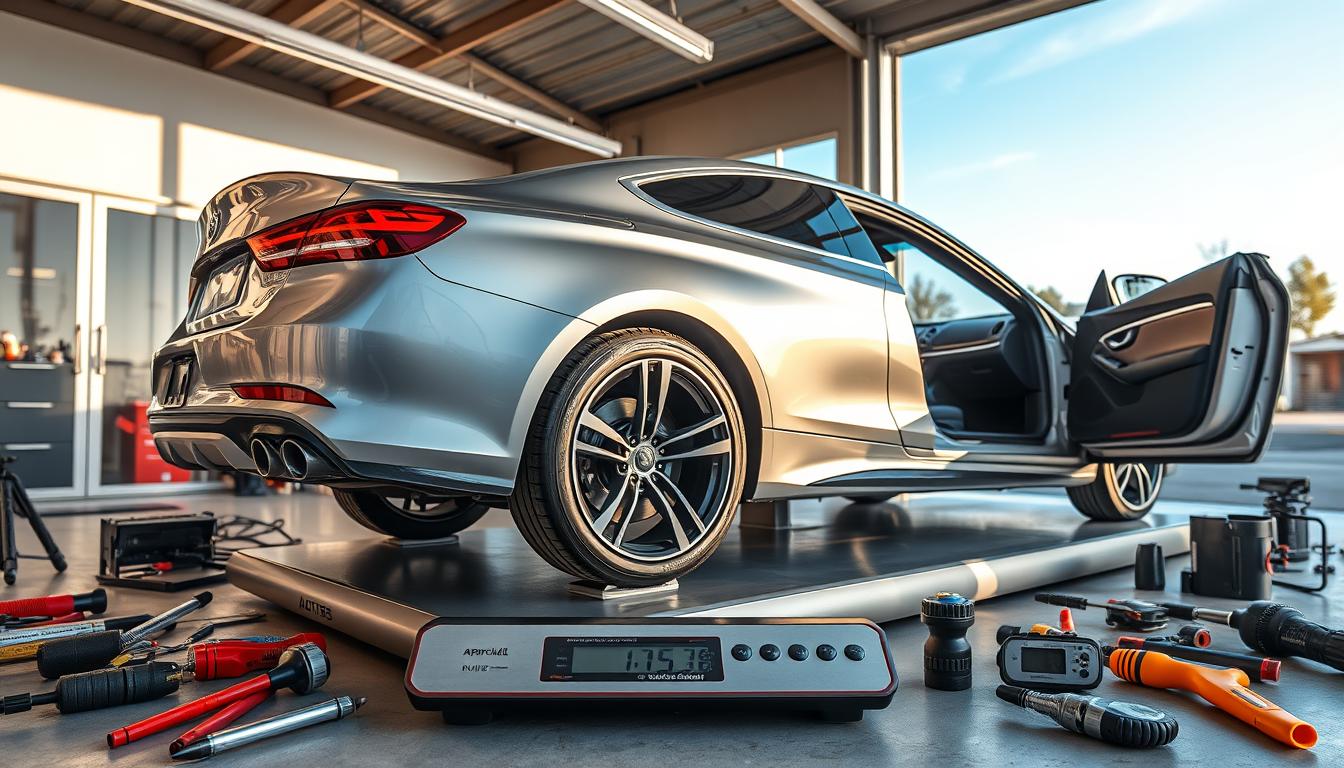An estimated 75% of vehicle owners remain oblivious to their car’s true market value. This alarming figure underscores the critical role of automotive appraisal in enabling drivers to make informed decisions regarding vehicle acquisition, disposal, or insurance. An automotive appraisal represents a formal evaluation that ascertains a vehicle’s worth, pivotal for both buyers and sellers seeking a comprehensive understanding of their options. The escalating demand for precise vehicle valuation underscores the imperative for specialized automotive appraisal services, ensuring that individuals are not left uninformed about their automotive investments.
Armed with the right information, you can confidently navigate the intricate landscape of the automotive market. Whether your goal is to sell your vehicle or secure optimal insurance coverage, grasping your vehicle’s value is paramount. For a more in-depth exploration of the appraisal process, refer to this informative guide.
Key Takeaways
- 75% of vehicle owners underestimate their car’s market value.
- Automotive appraisal helps buyers, sellers, and insurers accurately value vehicles.
- Expert automotive appraisal services provide essential insights for informed decisions.
- Understanding vehicle valuation can enhance negotiation outcomes.
- A proper appraisal process can make a significant difference in resale value.
- Knowledge of your vehicle’s worth is crucial in today’s market.
What is Automotive Appraisal?
Automotive appraisal entails a meticulous evaluation of a vehicle’s worth, encompassing a thorough assessment process. This service is paramount for several reasons. It ensures equitable transactions, guarantees adequate insurance coverage, and affords peace of mind to both buyers and sellers.
Definition and Importance
An automotive appraisal represents a comprehensive analysis of a vehicle’s market value. It considers various factors, including the vehicle’s condition, age, and any modifications or repairs undertaken. Car appraisal services are indispensable in establishing a fair value for both sellers and buyers. These evaluations are vital for insurance adjustments and facilitating sales, ensuring all parties have a clear understanding of the vehicle’s true worth.
Key Components of an Appraisal
A professional vehicle appraisal hinges on several critical components that contribute to the final valuation. These include:
- Vehicle Condition: Detailed assessments of exterior and interior aspects.
- Historical Data: Previous repair histories and ownership records.
- Market Trends: Current demand and comparable sales in the market.
By integrating these elements, automotive appraisals offer a comprehensive view of a vehicle’s value. This benefits both buyers and sellers as they navigate their transactions.
The Automotive Appraisal Process
The intricacies of the automotive appraisal process elucidate the methodology behind evaluating a vehicle’s intrinsic value. This procedure is segmented into three pivotal stages: initial evaluation, meticulous examination, and conclusive valuation. Each segment is indispensable in ascertaining the precise monetary worth of your vehicle, particularly when utilizing the services of a distinguished auto appraisal entity.
Initial Assessment
The inaugural phase commences with a certified vehicle appraiser scrutinizing critical documents such as titles, service histories, and prior appraisal reports. A dialogue with the vehicle’s proprietor facilitates the revelation of its antecedents, condition, and any alterations undertaken. This preliminary step lays the groundwork for a detailed assessment, applicable to both vintage and contemporary vehicles.
Detailed Inspection
The subsequent phase, the detailed inspection, encompasses a thorough examination of both mechanical and aesthetic aspects of the vehicle. The appraiser inspects the vehicle’s bodywork, engine, tires, and operational capabilities. The identification of defects, wear indicators, or distinctive attributes is imperative for an exact valuation. This exhaustive evaluation guarantees that all factors influencing the vehicle’s value are meticulously assessed, a consideration of paramount importance for classic vehicles where uniqueness significantly impacts market valuation.
Final Valuation
Upon the conclusion of the inspection, the appraiser synthesizes the data into a detailed report. This final valuation, informed by current market trends and appraisal benchmarks, yields an accurate estimation of the vehicle’s value. This assessment not only aids in guiding potential buyers and sellers but also fulfills insurance requirements, ensuring adequate coverage for the vehicle.
Types of Automotive Appraisals
Grasping the nuances of automotive appraisals is paramount for vehicle proprietors. Each appraisal variant caters to a specific objective, thereby shaping the perceived value of a vehicle across diverse scenarios. This discourse delves into three fundamental appraisal categories, pivotal for informed decisions on vehicle valuation.
Market Value Appraisal
A market value appraisal aims to ascertain a vehicle’s worth against prevailing market standards. It scrutinizes the transactional values of analogous vehicles, facilitating the establishment of a competitive pricing strategy for sale or trade-in. Considerations include mileage, condition, and the model’s market demand.
Insurance Appraisal
An insurance appraisal is indispensable for those in pursuit of comprehensive coverage. It evaluates the vehicle’s value for insurance purposes, ensuring sufficient coverage against loss or damage. An insurance appraisal facilitates financial protection, mitigating potential financial risks.
Pre-Sale Appraisal
Securing a pre-sale appraisal is crucial for optimizing selling potential. This detailed assessment offers a precise valuation, empowering sellers to make strategic decisions that bolster their negotiation stance. Anticipatory knowledge of a vehicle’s value can significantly influence sale outcomes.
Factors Influencing Vehicle Value
Grasping the myriad factors that shape a vehicle’s worth is paramount for a precise valuation during an automotive appraisal. Several elements significantly influence a vehicle’s market value.
Mileage and Condition
Mileage is a pivotal indicator of a vehicle’s condition and potential longevity. Lower mileage generally implies less wear, enhancing its appeal to potential buyers. Beyond mileage, condition encompasses both physical appearance and mechanical integrity. A meticulously maintained vehicle not only preserves its value but also instills confidence during the appraisal process.
Age and Model
The age of a vehicle directly correlates with its depreciation rate. Typically, newer models hold higher market values. Moreover, the model’s popularity impacts desirability. Popular brands tend to appreciate more over time, whereas lesser-known models may depreciate faster during the valuation process.
Market Demand
Market demand is subject to fluctuations due to trends, economic conditions, and seasonal factors. For example, demand for trucks and SUVs often peaks during certain seasons. Recognizing current market trends can offer insights into optimal appraisal timing for maximum value. For further information on these critical factors, refer to our terms of use.
How to Prepare for an Automotive Appraisal
The preparation for a professional vehicle appraisal necessitates a series of critical steps. This meticulous process ensures a thorough and precise evaluation of your vehicle’s worth. By meticulously organizing necessary documents, presenting your vehicle in optimal condition, and disclosing its full history, you significantly enhance the efficiency of the appraisal process with an auto appraisal company.
Gather Necessary Documents
Initiate by compiling all pertinent documents related to your vehicle. This encompasses maintenance records, purchase receipts, warranty details, and the title. The availability of these documents facilitates the appraiser’s comprehension of your vehicle’s background. A diligently prepared owner significantly bolsters the credibility of the appraisal process.
Clean and Inspect Your Vehicle
A meticulous cleaning of your vehicle is crucial for its presentation during the appraisal. The removal of personal items, thorough vacuuming of the interior, and exterior washing are essential to highlight its condition. Moreover, conducting a self-inspection to identify minor repairs that could elevate its value is advisable. These preparatory measures are instrumental in optimizing the appraisal’s outcome.
Be Open and Honest About Vehicle History
Transparency is paramount when preparing for an automotive appraisal. It is imperative to disclose any pertinent information regarding accidents, service history, or modifications. Honest and comprehensive disclosure fosters trust with the appraiser, leading to a more accurate valuation. Engaging with a reputable auto appraisal company can streamline this process. For additional insights, refer to steps to prepping your car for optimal appraisal.
Professional vs. DIY Appraisals
The distinction between professional automotive appraisals and DIY appraisals is crucial for vehicle proprietors. Each approach presents unique benefits and drawbacks, significantly impacting the appraisal process. An understanding of these aspects is essential for making well-informed decisions regarding vehicle valuation.
Benefits of Professional Appraisals
Engaging a certified vehicle appraiser offers numerous advantages:
- Expertise: Professionals are well-versed in market trends and vehicle conditions, ensuring precise valuations.
- Credibility: A reputable appraiser enhances the credibility of your appraisal, critical in sales and insurance claims.
- Comprehensive Reports: Professional appraisals provide detailed documentation supporting the valuation, beneficial for both buyers and sellers.
Risks of DIY Appraisals
Despite the allure of cost savings, DIY appraisals pose several risks:
- Inaccuracy: Without proper training, owners may misjudge the market value, leading to underpricing or overpricing their vehicle.
- Disputes: Inaccurate appraisals can lead to disputes during sales transactions or insurance settlements.
- Lack of Recognition: DIY appraisals typically lack the authority and credibility that a certified vehicle appraiser’s evaluation affords.
Finding a Qualified Appraiser
The selection of a qualified appraiser is paramount for an accurate automotive appraisal. The plethora of choices available renders the identification of the ideal professional challenging. The evaluation of a certified vehicle appraiser’s credentials is crucial, as it directly impacts the valuation’s precision and trustworthiness.
Credentials to Look For
In the quest for a reputable appraiser, certain credentials stand out:
- Certification: Verify that the appraiser possesses certifications from esteemed organizations.
- Experience: Seek a professional with extensive industry experience, especially in evaluating vehicles akin to yours.
- References: Examine reviews or testimonials from previous clients to assess their satisfaction.
Questions to Ask Potential Appraisers
Engaging potential appraisers with pertinent questions can offer deeper insights into their expertise. Some inquiries to consider include:
- What certifications do you possess as a certified vehicle appraiser?
- Can you provide a detailed breakdown of the automotive appraisal process?
- How do you determine the value of vehicles, and what resources do you utilize?
- What specific experience do you have related to my vehicle’s make and model?
Posing these questions will not only elucidate their qualifications but also facilitate the identification of an expert offering a car appraisal near me that aligns with your requirements.
The Role of Online Valuation Tools
The advent of technology has revolutionized the automotive appraisal process, enabling car owners to swiftly estimate their vehicle’s worth. Online vehicle valuation tools have emerged as a convenient means to access market data, providing a preliminary understanding of a car’s value. This accessibility is particularly advantageous for those seeking a general valuation without the need for in-person evaluations.
Advantages of Online Tools
Online valuation tools are increasingly popular due to their rapid and efficient nature. Their benefits include:
- Instant Estimates: Users can acquire quick approximations without the necessity of in-person evaluations.
- User-Friendly: These tools boast straightforward interfaces, requiring minimal user input.
- Access to Market Data: Most platforms leverage current market trends to deliver more precise estimations.
Limitations of Online Valuation
Despite their advantages, online tools also present limitations that must be acknowledged. Key considerations include:
- Lack of In-Depth Analysis: Online vehicle valuation may overlook specific details that a certified appraiser would identify during a comprehensive inspection.
- Potential for Inaccuracies: The variability of data sources can result in estimates that diverge significantly from professional appraisals.
- Generic Values: These tools might not account for unique attributes such as custom modifications or rare models, which can impact actual value.
Car owners should consider online vehicle valuation as an initial step rather than a definitive conclusion. For critical transactions, combining automated estimates with professional input is crucial for a thorough understanding of vehicle worth. Leveraging these vehicle valuation tools effectively can facilitate informed decisions, whether selling, trading, or purchasing vehicles.
Understanding Appraisal Reports

Automotive appraisal reports are indispensable documents that encapsulate the essence of vehicle valuation processes. They offer a detailed examination of a vehicle’s worth and condition. Grasping these elements is crucial for vehicle owners to make strategic decisions in sales, insurance, or other transactions.
Key Elements of the Report
An automotive appraisal report encompasses several critical components:
- Summary of Findings: An overview of the vehicle’s valuation.
- Detailed Assessments: Insights into the vehicle’s condition, features, and market comparisons.
- Comparable Sales Data: Information on similar vehicles to justify the valuation.
How to Interpret the Findings
Deciphering the findings of an appraisal report necessitates a grasp of the metrics involved in vehicle valuation. Seek out sections detailing the vehicle’s condition and any factors impacting its overall value. For example, discrepancies in mileage, previous damage, and locality significantly influence the appraisal. Understanding these aspects enhances engagement with car appraisal services and facilitates negotiations for selling or insuring your vehicle.
Automotive Appraisal for Insurance Purposes
The importance of a professional vehicle appraisal cannot be overstated when contemplating insurance coverage. An appraisal for insurance purposes delineates the requisite coverage amount to adequately protect a vehicle. This evaluation is paramount for safeguarding a vehicle against potential loss or damage, thereby ensuring the owner’s asset is adequately insured.
Why Insurance Appraisals Matter
Insurance appraisals are indispensable in ascertaining a vehicle’s market value, a determinant of the coverage extent provided by an insurance policy. The appraisal process scrutinizes various factors, including vehicle condition, mileage, and prevailing market trends. This thorough examination guarantees that owners neither underinsure nor overpay for their coverage.
How to Choose the Right Coverage
In the selection of insurance coverage, the utilization of insights from a professional vehicle appraisal is paramount. Consider the following steps:
- Understand your vehicle’s value: The appraisal will provide a precise valuation of your vehicle’s worth.
- Evaluate your needs: Assess the coverage amount necessary based on your usage patterns and potential risks.
- Consult with your insurer: Utilize the appraisal findings to engage in an informed dialogue with your insurance provider regarding optimal policy options.
For further information on leveraging your appraisal for insurance purposes, visit this resource.
After the Appraisal: Next Steps
Upon completion of an automotive appraisal, the strategic utilization of the resultant data is paramount. The comprehension of your vehicle’s valuation is essential, irrespective of your intentions to sell or trade it in. Furthermore, adept management of any appraisal discrepancies is imperative for a seamless transactional process.
Using the Appraisal for Sale or Trade-In
The appraisal serves as a definitive indicator of your vehicle’s market value. This information is pivotal in negotiations, allowing for the optimization of your position. To effectively leverage this data, consider the following strategies:
- Establish a competitive asking price aligned with the appraisal’s valuation.
- Utilize the appraisal document to bolster credibility with potential buyers or dealers.
- Be prepared to articulate any factors influencing your vehicle’s valuation.
Disputing an Appraisal Discrepancy
Occasionally, discrepancies may emerge between your expectations and the appraiser’s valuation. In such scenarios, the following actions are advisable:
- Thoroughly review the appraisal report to grasp the valuation rationale.
- Compile supplementary documentation that substantiates your claim of higher value, encompassing service records and market analyses.
- Engage the appraiser in dialogue to clarify the valuation methodology and present your counterarguments.
Frequently Asked Questions about Automotive Appraisal

Exploring the realm of automotive appraisals often precipitates a multitude of inquiries. Addressing these common queries is crucial, as it facilitates a deeper understanding of the appraisal process, the associated costs, and the variables influencing vehicle valuation.
What is the Cost of an Appraisal?
The financial outlay for an automotive appraisal is subject to considerable variability, influenced by several determinants. These include the type of vehicle, geographical location, and the appraiser’s level of expertise. Typically, the cost can span from $100 to $300. For rare or classic vehicles, a certified appraiser may demand a premium, yet the investment in a reputable service is often justified by the accuracy of the valuation.
How Often Should You Get an Appraisal?
The necessity for appraisals varies significantly depending on individual circumstances. Owners of classic or collectible vehicles are advised to seek appraisals every few years or post any substantial alterations to the vehicle’s condition. Conversely, those with modified vehicles should consider obtaining appraisals after significant modifications, ensuring that the valuation accurately reflects the car’s updated worth.
Can I Appraise a Car with Modifications?
Indeed, a certified vehicle appraiser is equipped to evaluate cars with modifications. Such modifications can either elevate or depreciate the vehicle’s value, contingent upon their quality and market demand. The appraisal process meticulously considers these modifications, thereby providing a comprehensive valuation that accurately mirrors the car’s market value.
Conclusion: Why Choose Expert Automotive Appraisal Services
In the rapidly evolving automotive landscape, grasping the true worth of your vehicle is paramount. Expert automotive appraisal services offer profound insights, ensuring you are cognizant of your car’s market value. By entrusting your vehicle’s appraisal to certified professionals, you receive precise evaluations, grounded in thorough assessments and market analyses. This facilitates well-informed decisions during transactions or insurance negotiations, thereby optimizing your financial outcomes.
Final Thoughts on Vehicle Value
The valuation of vehicles is subject to numerous variables, including model, condition, and demand dynamics. Procuring an expert appraisal transcends mere valuation; it imparts access to specialized knowledge, empowering a strategic approach to managing your automotive assets. Whether you are contemplating a sale or simply wish to remain apprised of your vehicle’s worth, comprehending its value is an essential aspect of car ownership.
Call to Action: Schedule Your Appraisal Today
Delaying the understanding of your vehicle’s value can prove detrimental. Initiate the process of automotive appraisal with a reputable service center to garner quality insights and bespoke advice aligned with your requirements. Proactive measures ensure the prudent management and accurate valuation of your investment over time.
